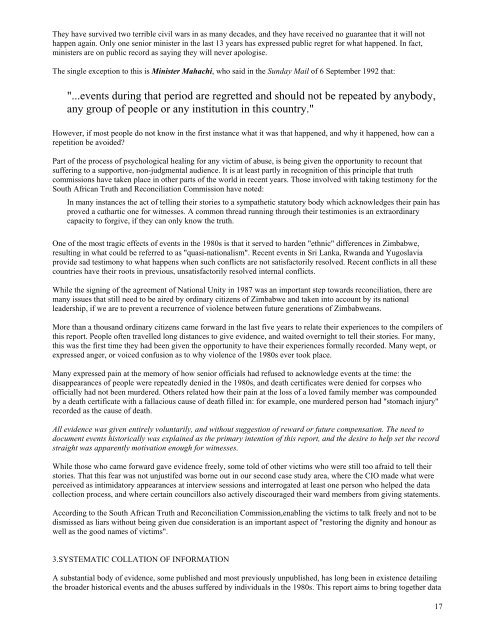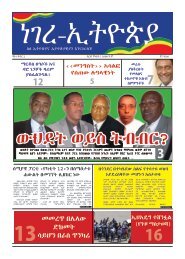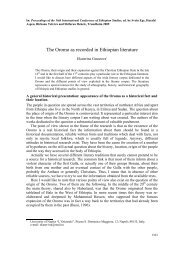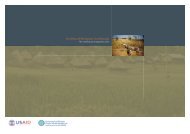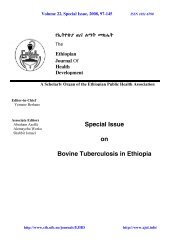MatabelelandReport
MatabelelandReport
MatabelelandReport
Create successful ePaper yourself
Turn your PDF publications into a flip-book with our unique Google optimized e-Paper software.
They have survived two terrible civil wars in as many decades, and they have received no guarantee that it will not<br />
happen again. Only one senior minister in the last 13 years has expressed public regret for what happened. In fact,<br />
ministers are on public record as saying they will never apologise.<br />
The single exception to this is Minister Mahachi, who said in the Sunday Mail of 6 September 1992 that:<br />
"...events during that period are regretted and should not be repeated by anybody,<br />
any group of people or any institution in this country."<br />
However, if most people do not know in the first instance what it was that happened, and why it happened, how can a<br />
repetition be avoided?<br />
Part of the process of psychological healing for any victim of abuse, is being given the opportunity to recount that<br />
suffering to a supportive, non-judgmental audience. It is at least partly in recognition of this principle that truth<br />
commissions have taken place in other parts of the world in recent years. Those involved with taking testimony for the<br />
South African Truth and Reconciliation Commission have noted:<br />
In many instances the act of telling their stories to a sympathetic statutory body which acknowledges their pain has<br />
proved a cathartic one for witnesses. A common thread running through their testimonies is an extraordinary<br />
capacity to forgive, if they can only know the truth.<br />
One of the most tragic effects of events in the 1980s is that it served to harden "ethnic" differences in Zimbabwe,<br />
resulting in what could be referred to as "quasi-nationalism". Recent events in Sri Lanka, Rwanda and Yugoslavia<br />
provide sad testimony to what happens when such conflicts are not satisfactorily resolved. Recent conflicts in all these<br />
countries have their roots in previous, unsatisfactorily resolved internal conflicts.<br />
While the signing of the agreement of National Unity in 1987 was an important step towards reconciliation, there are<br />
many issues that still need to be aired by ordinary citizens of Zimbabwe and taken into account by its national<br />
leadership, if we are to prevent a recurrence of violence between future generations of Zimbabweans.<br />
More than a thousand ordinary citizens came forward in the last five years to relate their experiences to the compilers of<br />
this report. People often travelled long distances to give evidence, and waited overnight to tell their stories. For many,<br />
this was the first time they had been given the opportunity to have their experiences formally recorded. Many wept, or<br />
expressed anger, or voiced confusion as to why violence of the 1980s ever took place.<br />
Many expressed pain at the memory of how senior officials had refused to acknowledge events at the time: the<br />
disappearances of people were repeatedly denied in the 1980s, and death certificates were denied for corpses who<br />
officially had not been murdered. Others related how their pain at the loss of a loved family member was compounded<br />
by a death certificate with a fallacious cause of death filled in: for example, one murdered person had "stomach injury"<br />
recorded as the cause of death.<br />
All evidence was given entirely voluntarily, and without suggestion of reward or future compensation. The need to<br />
document events historically was explained as the primary intention of this report, and the desire to help set the record<br />
straight was apparently motivation enough for witnesses.<br />
While those who came forward gave evidence freely, some told of other victims who were still too afraid to tell their<br />
stories. That this fear was not unjustifed was borne out in our second case study area, where the CIO made what were<br />
perceived as intimidatory appearances at interview sessions and interrogated at least one person who helped the data<br />
collection process, and where certain councillors also actively discouraged their ward members from giving statements.<br />
According to the South African Truth and Reconciliation Commission,enabling the victims to talk freely and not to be<br />
dismissed as liars without being given due consideration is an important aspect of "restoring the dignity and honour as<br />
well as the good names of victims".<br />
3.SYSTEMATIC COLLATION OF INFORMATION<br />
A substantial body of evidence, some published and most previously unpublished, has long been in existence detailing<br />
the broader historical events and the abuses suffered by individuals in the 1980s. This report aims to bring together data<br />
17


